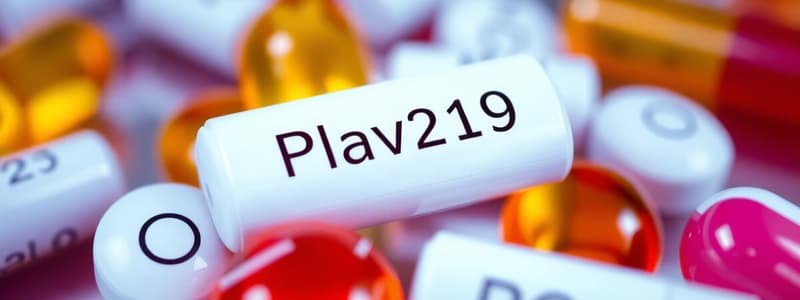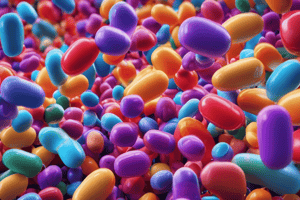Podcast
Questions and Answers
What role does the enzyme CYP2C19 play in the effectiveness of Plavix?
What role does the enzyme CYP2C19 play in the effectiveness of Plavix?
Which drug is a tissue plasminogen activator (tPA) used in thrombolytic therapy?
Which drug is a tissue plasminogen activator (tPA) used in thrombolytic therapy?
What is the primary function of antifibrinolytics in clinical practice?
What is the primary function of antifibrinolytics in clinical practice?
Which two medications are commonly advised against when using statins due to potential interactions?
Which two medications are commonly advised against when using statins due to potential interactions?
Signup and view all the answers
What is the main adverse effect associated with HMG-CoA reductase inhibitors (statins)?
What is the main adverse effect associated with HMG-CoA reductase inhibitors (statins)?
Signup and view all the answers
What condition may result from the breakdown of muscle protein in patients taking statins?
What condition may result from the breakdown of muscle protein in patients taking statins?
Signup and view all the answers
Which of the following is a common treatment for excessive bleeding due to surgical complications?
Which of the following is a common treatment for excessive bleeding due to surgical complications?
Signup and view all the answers
How much do statins typically reduce LDL cholesterol levels?
How much do statins typically reduce LDL cholesterol levels?
Signup and view all the answers
What is the primary role of anticoagulants in the management of blood clotting?
What is the primary role of anticoagulants in the management of blood clotting?
Signup and view all the answers
Which drug is associated with teratogenic effects?
Which drug is associated with teratogenic effects?
Signup and view all the answers
What is a common monitoring requirement for patients on Warfarin?
What is a common monitoring requirement for patients on Warfarin?
Signup and view all the answers
Which of the following is NOT a characteristic of LMWHs (low molecular weight heparin)?
Which of the following is NOT a characteristic of LMWHs (low molecular weight heparin)?
Signup and view all the answers
What is the main action of antiplatelet drugs?
What is the main action of antiplatelet drugs?
Signup and view all the answers
Which statement about heparin is incorrect?
Which statement about heparin is incorrect?
Signup and view all the answers
Why is it important for patients taking Warfarin to maintain a consistent intake of vitamin K?
Why is it important for patients taking Warfarin to maintain a consistent intake of vitamin K?
Signup and view all the answers
What type of drug is Clopidogrel bisulfate?
What type of drug is Clopidogrel bisulfate?
Signup and view all the answers
What is a major contraindication for the use of bile acid sequestrants?
What is a major contraindication for the use of bile acid sequestrants?
Signup and view all the answers
Which of the following drugs is an example of a bile acid-binding resin?
Which of the following drugs is an example of a bile acid-binding resin?
Signup and view all the answers
What side effect can bile acid sequestrants help alleviate?
What side effect can bile acid sequestrants help alleviate?
Signup and view all the answers
Which vitamin levels might be reduced due to the high doses of bile acid sequestrants?
Which vitamin levels might be reduced due to the high doses of bile acid sequestrants?
Signup and view all the answers
What is a common side effect of Niacin when used in higher doses as an antilipemic?
What is a common side effect of Niacin when used in higher doses as an antilipemic?
Signup and view all the answers
Which mechanism of action is associated with fibrates?
Which mechanism of action is associated with fibrates?
Signup and view all the answers
What risk is increased when fibrates are used in conjunction with statins?
What risk is increased when fibrates are used in conjunction with statins?
Signup and view all the answers
Patients on long-term therapy with bile acid sequestrants may need which of the following?
Patients on long-term therapy with bile acid sequestrants may need which of the following?
Signup and view all the answers
Study Notes
Antiplatelet Agents
- Plavix (clopidogrel) requires activation by enzyme CYP2C19; inhibitors of this enzyme diminish its effectiveness in preventing blood clots.
Thrombolytics
- Thrombolytics dissolve thrombi to restore blood flow.
- Tissue Plasminogen Activator (t-PA) converts plasminogen into plasmin for clot lysis.
- Notable tPA therapies:
- Alteplase (Activase)
- Tenecteplase (TNKase)
- Commonly used for acute ischemic stroke, acute myocardial infarction (MI), and massive pulmonary embolism (PE).
- tPA has a short half-life (~5 minutes), providing rapid action.
Antifibrinolytics
- Antifibrinolytics hinder the action of tPA to support clot formation, preventing excessive bleeding during surgeries.
- Key antifibrinolytic agents:
- Tranexamic Acid (Cyklokapron)
- Desmopressin Acetate (DDAVP) — effective in hemophilia A and type I von Willebrand’s disease.
- Aprotinin (Artiss, Trasylol)
Antilipemics
- Cholesterol and triglycerides necessitate apolipoproteins to form lipoproteins for transport in blood.
- LDL is termed "bad cholesterol" and HDL is "good cholesterol."
Dyslipidemia Management
- Initial management options include lifestyle changes, followed by pharmacologic interventions based on lipid profiles.
- Statins (HMG-CoA reductase inhibitors) are first-line agents, reducing LDL by 30-40% and increasing HDL by 2-15%.
- Common statins:
- Simvastatin (Zocor)
- Atorvastatin (Lipitor)
- Statins function by inhibiting HMG-CoA reductase, though they may cause muscle-related adverse effects including rhabdomyolysis and myoglobinuria.
Other Dyslipidemic Medications
- Bile Acid Sequestrants: Bind bile acids, preventing reabsorption — can treat diarrhea through resulting constipation.
- Cholestyramine (Olestyr)
- Niacin (vitamin B3) is effective for lowering lipid levels but may cause flushing and GI issues; starting with low doses can mitigate side effects.
Fibric Acid Derivatives (Fibrates)
- Fibric acid derivatives activate lipoprotein lipase, enhancing cholesterol breakdown and increasing HDL by 25%.
- Examples include bezafibrate, gemfibrozil, and fenofibrate; use with caution due to potential liver and kidney complications.
Coagulation Modifiers
- These drugs alter the coagulation cascade to either inhibit clot formation or promote clot lysis.
Anticoagulants
- Effective immediately, they prevent new blood clots and inhibit existing clots from worsening.
- Common anticoagulants include:
- Heparin Sodium: Requires monitoring of aPTT, with protamine sulfate as its antidote; useful for DVT.
- Low Molecular Weight Heparins (LMWH): Such as enoxaparin (Lovenox); focus primarily on factor Xa.
- Warfarin (Coumadin): Oral vitamin K antagonist; teratogenic with a delayed therapeutic effect requiring INR monitoring.
Xa Inhibitors
- Provide prevention and treatment for DVT by inhibiting factor Xa.
- Examples include apixaban (Eliquis).
Antiplatelet Medications
- Aspirin and clopidogrel prevent platelet aggregation; both carry risks of bleeding.
- Aspirin is chewable for rapid absorption and must be withheld prior to surgery to avoid prolonged effects on platelets.
Key Considerations
- Patients on statins must avoid grapefruit due to drug interactions that increase muscle damage risks.
- Maintain a consistent vitamin K intake while on warfarin to avoid fluctuations in anticoagulant effect.
- Patients on long-term lipid-lowering therapy may require supplementation of fat-soluble vitamins (A, D, K).
- Educate patients on the delayed onset of medication effectiveness and monitor for adverse effects, especially with liver enzymes.
Studying That Suits You
Use AI to generate personalized quizzes and flashcards to suit your learning preferences.


